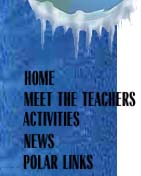Measurement and Modeling of the Variability of Lake Ice Growth and Decay in Alaska

Aurora Pond, Fairbanks, Alaska-January 15, 2002
(Dr. Martin Jeffries, Researcher and Shannon Graham, TEA parcticipant)
Today was my first trial with snow probes on Aurora Lake.
For accurate measurement of base termperature,
the thermistor on the snow probe must be in contact with the ice.
|
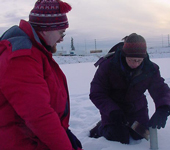
Aurora Pond, Fairbanks, Alaska-January 15, 2002
(Martin Jeffries, Researcher and Shannon Graham, TEA parcticipant)
Martin advised best technique for collecting snow samples.
|
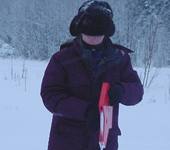
Jalpertia Pond, Poker Flat Research Range, Alaska -January 21, 2002
(Lynette Reep, Sign Language Interpreter)
Lynette created a transect of 80 meters with a measuring tape on Jalpertia pond.
|

Jalpertia Pond, Poker Flat Research Range, Alaska -January 21, 2002
(Martin Jeffries, Researcher)
Martin labeled stakes for markers at every 5 meters.
|
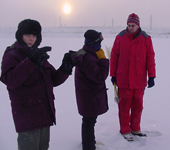
Aurora Pond, Fairbanks, Aaska-January 23, 2002
(Lynette Reep, ASL interpreter; Sandra Kolb, former TEA parcticipant; & Martin Jeffries, Researcher)
Martin explained snow depth and ice thickness procedures
to previous TEAntarctic parcticipant, Sandra Kolb.
|
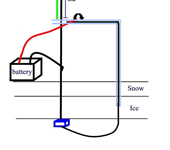
Image created by Graham, hot wire gauge -January 24, 2002
The second part of ice thickness measurements
using the hot wire gauge is L2. The resistance
wire is heated with a 12 Volt battery, the ice melts
just enough for the wire to slide through until
the toggle hits the base of the ice. L2 is the length
between the wooden handle to the aluminum tube.
To determine ice thickness, the sum of L1 and L2
is subtracted from the total wire length.
|
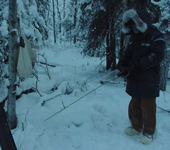
MST Woods transect, Poker Flat Research Range, Alaska -January 26, 2002
(Shannon Graham, TEA parcticipant)
Surface temperature in the ³woods² at MST pond.
|
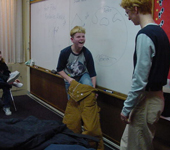
Washington School for the Deaf (middle school), Vancouver, Washington-Febuary 20, 2002
(Middle school students and Shannon Graham, TEA parcticipant)
After my
field visit, I shared my experience with all departments.
Here was with middle school students. They had the opportunity to try on some cold weather gear.
|
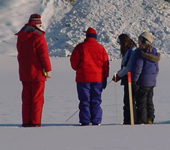
Aurora Pond, Fairbanks, Alaska - March 6, 2002
(Martin Jeffries, Researcher and three home school students)
Martin worked with home school students on Aurora pond.
Eventually, these three students will collect data independently.
|
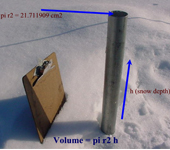
Snow Density equipment-March 7, 2002
Snow tube is used to collect snow. To find volume of the snow, we multiply the area of the circle and snow depth.
|

Aurora Pond, Fairbanks, Alaska-March 8, 2002
(Students from Ron Reihlıs science class)
Students from Fairbanks took a field trip to Aurora pond to experience snow and ice science.
|

Jalpertia Pond, Poker Flat Research Range, Alaska-March 9, 2002
(Martin Jeffries, Researcher)
Next to a meter stick, Martin measured the ice thickness using this aluminum rod.
|
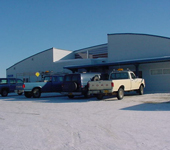
Poker Flat Research Range, Alaska-March 13, 2002
On every trip to the ponds, we stopped at Poker Flat
> to change clothes and sign in.
We also took lunch breaks here
|
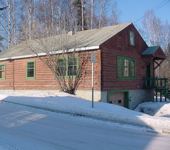
Nordic House, University of Alaska Fairbanks-March 13, 2002
Lynette, ASL interpreter and I stayed in the Nordic House
at the University of Alaska Fairbanks.
|

Poker Flat Main Buildling, Alaska-March 18, 2002
(Marge Porter, former TEA parcticipant; Martin Jeffries, Researcher; Lynette Reep, ASL interpreter)
Marge Porter flew from Conneticut to parcticipate in Martinıs
mentoring workshop for his project with Fairbanks teachers.
We all went out to the ponds together, this is our lunch break.
|
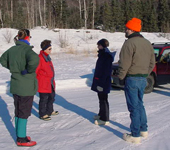
Jalpertia Pond, Poker Flat Research Range, Alaska-March 20, 2002
(Left to Right) (Joanna Hubbard, Marge Porter, Sandra Kolb,
former TEA parcticipants and Ron Reihl, Fairbanks teacher)
Three TEA teachers and Fairbanks teacher,
Ron collected data from four ponds.
This is to give new people a taste of Martinıs research
in order to better understand Martin and Ronıs
project for Fairbanks teachers
|
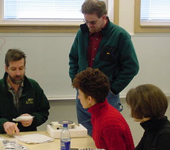
Poker Flat Main Buildling, Alaska-March 20, 2002
(Left to Right) (Ron Reihl, Fairbanks teacher; Martin Jeffries,
Researcher; Marge Porter & Sandra Kolb, former TEA partcipants)
Ron, Marge, and Sandra measured mass from their ponds.
|
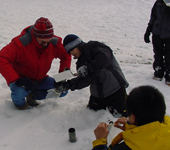
Howard Luke Camp, Tanana River, Alaska-March 26, 2002
(Martin Jeffries, Researcher & elementary students)
One of Martinıs teachers from his snow and ice course
invited him to provide snow and ice activities for upper elementary
students as part of their field trip.
|
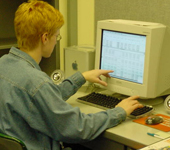
Geophyscial Institute, University of Alaska Fairbanks-March 28, 2002
(Shannon Graham, TEA parcticipant)
Shannon entered raw data from Poker Flat into Sigma Plot,
which automatically calculates conductive heat flux.
|
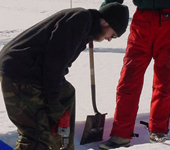
Jalpertia Pond, Poker Flat Research Range, Alaska-March 30, 2002
(Craig Bosveld, Research assistant)
Craig worked with Martin all year on Poker Flat.
On Saturdays, he helps with data collection and
does some data entry during the week.
|
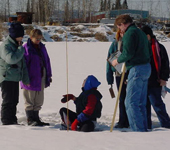
Aurora Pond, Fairbanks, Alaska-April 4, 2002
(Martin Jeffries, Researcher, two teachers of the deaf and three deaf students)
Martin explained snow depth technique.
|
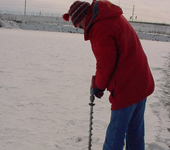
Aurora Pond, Fairbanks, Alaska-April 10, 2002
(Martin Jeffries, Researcher)
Temperatures increased but ice continued to increase.
Martin decided today was a good day to
measure water depth for the first time this season.
|
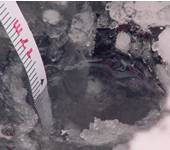
Aurora Pond, Fairbanks, Alaska-April 10, 2002
At the end of this measuring tape was a set of heavy weights.
The weights are let down to the bottom.
Water depth on Aurora pond was approximately 17 meters.
|
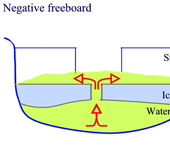
April 11, 2002
Image created by Shannon. This image was used in the journal to illustrate
negative freeboard. Often when snow density increases,
stress fractures are created allowing water
to seep through. When ice is drilled, water flows freely.
|
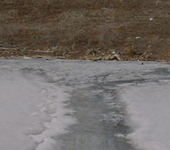
Aurora Pond, Fairbanks, Alaska-April 17, 2002
Temperatures continued to increase.
The snow cover melted drastically leaving large puddles of water.
Home school kids were not concerned and immediately proceeded with their work.
|
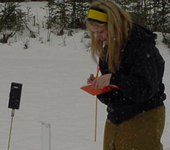
Jalpertia Pond, Poker Flat Research Range, Alaska-April 20, 2002
(Cindy, Fairbanks teacher)
As part of Martin Jeffries' snow and ice course,
teachers from Fairbanks parcticipated in field experience.
|

MST Pond, Poker Flat Research Range, Alaska-April 23, 2002
(Shannon Graham, TEA parcticipant and Martin Jeffries, Researcher)
Martin and I cleared approximately 1 x 1 sq ft for drilling.
We measured accumulated snow ice and congelation ice.
|
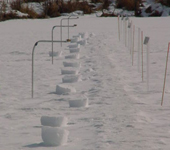
MST Pond, Poker Flat Research Range, Alaska-April 23, 2002
Snow blocks are compressed from snow density.
After measuring snow and congelation ice,
these blocks were returned.
|
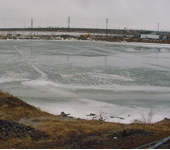
Aurora Pond, Fairbanks, Alaska-April 27, 2002
Aurora pond (photographed) lost its snow cover with 18 inches of rain today.
The water on the ice is snowmelt. Ice thickness still remained approximately 75 cm.
|

Jalpertia Pond, Poker Flat Research Range, Alaska-April 28, 2002
(Martin Jeffries, Researcher and Shannon Graham, TEA parcticipant)
Goodbye Jalpertia pond!
Thank you for following us through journals and photographs.
(Photo taken 4/24)
|
|
